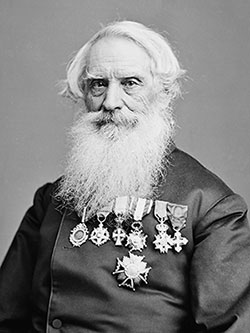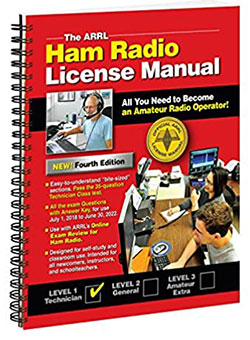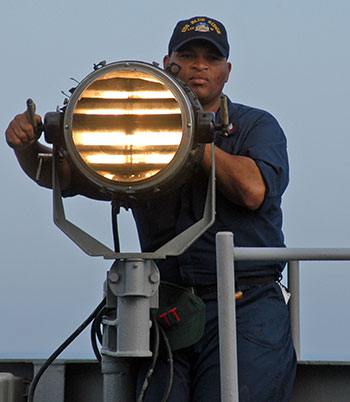
One of my communication goals is to finally learn Morse code. I’ve had my ham license for years now, but Morse has always been something that’s evaded me. It wasn’t until I started looking more into mobile radios – particularly ones that would be good for stashing in a bug out backpack – that I began to realize that learning Morse was something that I had to do if I wanted to have the most options available to me while I was out in the woods.
There are several benefits to learning Morse code:
- You become a better ham radio operator.
- It requires less power to transmit.
- There is a better “read value” to the message.
- Morse has better message security.
- You can use it for more than just radio.
Lets look at all of these in a bit more detail.
#1 – You Become a Better Ham Radio Operator

There seems to be increasing interest in ham radio within the prepping community. There is good reason for this. Ham radios allow you to have an adequate information flow post-disaster, meaning that you’ll be able to make wiser and safer decisions. Should there be some form of comms-down or grid-down scenario, ham radio allows you to still be able to get in touch with those whom you love and care about as well. Imagine the beginning of a grid-down event in the middle of the day.
Hypothetical scenario: You’re at your office when social unrest erupts downtown. Power is cut. You’re a 15-minute drive from home under normal circumstances. Your son and daughter are both at school, but being in different grades, one is at the middle school across town and one is at the high school not far away. You’re not really sure where your wife is.
With ham radio, you’d be able to get in touch with the people whom you need to contact with a minimal amount of fear and imagination.
Ham radio is virtually impossible to censor as well. Though you can’t get away with cuss words and the like on-air, ham radio allows you to have discussions on subjects that many forms of social media will not. As such, it’s a venue for free speech.
#2 – Morse Requires Less Power to Transmit
Morse code operates off of a lot less power than voice signal, and as a result, you’re able to send your message further distances than you otherwise could. This means that in bug out operations, you can actually carry a significantly lighter radio than you would need to otherwise to have the necessary power to transmit via voice.
I started getting interested in the Summits On The Air (SOTA) contests, and the great majority of those involved in such seem to utilize CW (continuous wave) transmissions exclusively. The radios they use are incredibly tiny, light, and don’t take up a lot of backpack space.
I don’t have to sacrifice as much space within my backpack for a radio. Instead, I can carry more food, a better survival tarp, or maybe a camp pillow as well. I’m freed up to not only carry different gear, but am able to lighten my load as well. This in turn means that I’ll burn less calories while on the move, have more energy for necessary tasks, and be able to move more quickly.
#3 – A Better “Read Value”
A Morse code message is more easily deciphered when static is present than a voice message. So, even if conditions aren’t ideal for radio transmissions, you’ll still be able to get your message across relatively clearly.
Hypothetical scenario: Let’s say a storm causes your vehicle to hydroplane and you get stuck in a ditch in the middle of nowhere. Your cell phone was destroyed in the accident, but your ham radio managed to survive. You’re not sure whether or not your antenna is going to transmit as far or well due to the background noise from the wind and being out in the boondocks.
BUT – if you opt to use Morse code to send that message, you are ensuring that somebody will be able to get your full message.
#4 – Improved Message Security
Not a lot of people are willing to sit down and take the time to learn Morse code. One of the things I don’t like about the ARRL is that they publicly list your address with your call sign. This means that literally anybody can type in your call sign and find out where you live. If you’re making voice transmissions on a mobile radio while on the move, this very well could indicate to others listening that you’re not at your house. If you were utilizing Morse however, there’s less risk of listeners being able to interpret who is making the transmission, what the transmission is, and whether or not you’re at your home.
In a grid-down TEOTWAWKI type environment, this could prove beneficial. Perchance the area bad guys are using radios to listen in on local transmissions, there’s a small chance they’d actually be able to gather any useful intel if you’re making all of your transmissions in Morse.
Did they learn Morse code? Maybe. Maybe not. It’s just something to think about.

#5 – You Can Use it for More than Just Radio
Morse code has a wide variety of situations in which it can be utilized, and they don’t all necessitate the use of a radio.
Blinking lights is another great way in which you can use Morse code to communicate for relatively far distances and silently as well. If you’re using Morse in such a situation, there is virtually zero chance of anybody else intercepting your message unless they are within the line of sight of your beacon.
If you don’t have a radio on your person, this could very easily prove to be a lifesaving means of communications. Sailors should certainly learn Morse for emergency communications.
Learn Morse Code Further Reading
There is nothing quite like the process of learning how to transmit written language through Morse code. It is, in fact, a different language. You will challenge your mind in a way you likely have not before, and if you’re a ham radio operator, real life practice will be much easier.
There are several reasons to become proficient in Morse code, and the learning of such will add yet another layer to your disaster resiliency. Though learning Morse is not for everyone, it is a great way to improve your radio skills.
Here are some great books to help you learn Morse code:
- As Easy as Morse: Memorize the Morse Code Using Fun Illustrations by Sanyukta Bhatnagar
- CW Geek’s Guide to Having Fun with Morse Code (audio book) by Dan Romanchick
- How to Learn Morse Code and Make Radio Contacts by David Gonzalez
- Morse Code Operating for Amateur Radio by ARRL
- Morse Code Practice Paper: Writing Notebook by Save Our Souls Notebooks
- Morse Code Signal Set Cards by U.S. Games Systems
- Nautical Flashcards – Morse Code for Boating & Sailing by Nautical Flashcards
- Samuel Morse, That’s Who! The Story of the Telegraph and Morse Code by Tracy Nelson Maurer
Are there other reasons to learn Morse code that we didn’t cover? What’s been your personal experience with Morse? Let us know in the comments below!
No comments:
Post a Comment